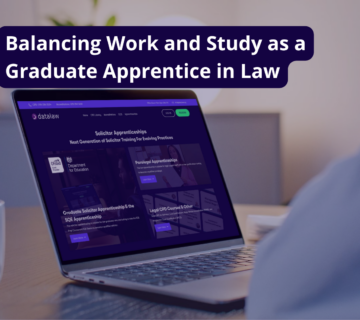In recent years, law degree apprenticeships have emerged as a credible and compelling alternative to the traditional university route into the legal profession. With the introduction of the Solicitors Qualifying Examination (SQE), aspiring solicitors now have more flexible ways to qualify, and for many, the structured nature of apprenticeships is proving to be the most supportive and sustainable path.
One of Datalaw’s Graduate Solicitor Apprentices, speaking candidly in a recent Q&A video, reflected on the clarity and structure this pathway has offered her as she works toward qualification. Her experience offers an insightful look at what makes the law degree apprenticeship so unique, and why it’s becoming a preferred route for many future solicitors.
Download our Free “Graduate Solicitor Apprenticeship” Brochure
A Clearer Route in a Competitive Field
Rio Kellman, on the Graduate Solicitor Apprenticeship explains, “it’s a more structured pathway to becoming a solicitor.” In a field where the traditional path can feel lengthy, uncertain, and financially burdensome, law degree apprenticeships offer a transparent timeline and tangible milestones.
Rio is currently working in criminal defence while progressing through the SQE-focused apprenticeship. Her route is mapped out clearly: she plans to sit SQE1 in January 2026 and SQE2 in October 2026, and once completed, she will have all her qualifying work experience hours ready to qualify virtually straight away. That sense of structure, knowing where you’re heading and when, can be incredibly motivating.
Support That Makes the Journey Sustainable
While structured, the apprenticeship journey is far from easy. “To be honest with you,” she admits, “it has been difficult, but it has been rewarding.” The dual demands of study and full-time work can be intense, especially in a high-stakes profession like law. However, Rio acknowledges that the support system embedded within Datalaw apprenticeships is what makes it manageable, and even enjoyable.
Rio credits her progress coach and supervising solicitor as vital sources of support. “If I am ever feeling overwhelmed, I have people I can speak to… they’re very good at prioritising people’s mental health and knowing if people are overwhelmed with work.” The presence of regular check-ins and a pastoral care approach ensures that apprentices aren’t left to struggle alone.
This level of structured mentorship, paired with academic study and real work responsibilities, creates a learning environment that is both demanding and nurturing, a balance that is difficult to achieve in other qualification routes.
A Route That Encourages Real Growth
The apprenticeship doesn’t just prepare you for exams, it actively grows your capability as a working legal professional. Working full-time while studying has given her exposure to a wide range of situations and legal practice areas.
“You do have to know a little bit about each area,” she explains. “Because of the apprenticeship, I’ve got a much more in-depth knowledge now. So when things do come up in my current job, I have much more understanding.”
In particular, she highlights how her real-world experience reinforced theoretical learning. “For example, a bail application in real life would probably just start with an email, but theoretically in a textbook, it would start with you drafting an application and discussing it with a court.” Seeing the contrast, and learning to connect theory with practice, has helped deepen her legal understanding and sharpen her professional instincts.
A System That Works for Everyone
Another key benefit of law degree apprenticeships is their accessibility, something the apprentice is especially passionate about.
“You can do it at any age, because you’re still being able to earn money while you’re doing it,” she says. “People with families simply can’t just study, they need to be able to support themselves.” The earn-as-you-learn model is ideal not only for recent graduates but also for career changers or individuals who need financial stability while pursuing a legal qualification.
And while the work-study balance can be tough, she emphasises its value: “It was always going to be overwhelming, being a solicitor is a very important job and it was never going to be an easy pathway… but Datalaw has made it as easy and enjoyable as it can be.”
Advice for the Journey
For those considering this route, her advice is honest and practical:
- “Stay resilient.” There will be hard days, but perseverance pays off.
- “The apprenticeship is a marathon, not a sprint.” Long-term effort leads to long-term reward.
- “Take advantage of the mentorship.” Learn from those around you, it’s one of the biggest benefits of this route.
- “Commit to the learning and development.” It’s a long-term process, and balancing work with study requires intention.
She also encourages aspiring apprentices to fully use the resources available, whether from Datalaw, mentors, or online communities, and to never hesitate to ask questions when preparing for the SQE.
Why Choose Datalaw’s Graduate Solicitor Apprenticeship?
For this apprentice, and many others, Datalaw has provided more than just a route to qualification. It’s offered a structured, supported, and financially viable way to become a solicitor, grounded in real experience and genuine mentorship.
Whether you’re a recent graduate, a career changer, or simply someone looking for a practical, professional route into law, Datalaw’s Law Apprenticeships offers pathways that combines academic excellence with real-world legal training.
Interested in this apprenticeship? Register your interest to learn more and receive detailed information on how to apply.
Discover more of our Legal Updates.



